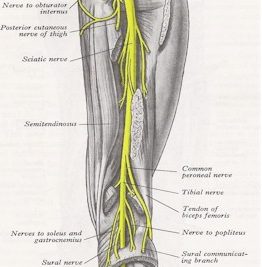At Worcester Chiropractic Clinic, we know that trapped nerves can be seriously painful.
Our Worcester Chiropractors treat people with trapped nerves on a daily basis. If you’re wondering why a trapped nerve hurts so much, hopefully this article will provide some answers.
For more information on trapped nerves, take a look at our trapped nerve factsheet.
What Does a Trapped Nerve Feel Like?
Trapped nerves can affect any part of your body. Examples of problems caused by trapped nerves our chiropractors frequently encounter include sciatica and carpal tunnel syndrome.
Because nerves carry a range of sensations, how a trapped nerve feels can vary greatly.
Most of the time, a trapped nerve feels like tooth-ache, but running down your arm or leg. Often this is accompanied by neck or back pain, with some limitation of movement.
It is also relatively common to experience numbness or pins and needles with a trapped nerve, and some people feel hot or cold sensations.
How Painful is a Trapped Nerve?
The level of pain experienced with a trapped nerve varies. That said, a trapped nerve can be excruciatingly painful.
In some instances pain can be so severe that movement is utterly impossible, and people can get “stuck” in one position.
When pain is so severe that even simple tasks like getting dressed are nearly impossible, our chiropractors recommend patients seek pharmacological intervention before attending Worcester Chiropractic Clinic.
Fortunately, the level of pain when you have a trapped nerve does not correspond with damage.
It is tempting to think that severe pain must mean there is some damage occurring, but this is not the case.
So, Why Are Trapped Nerves So Painful?
To answer this question, it is useful to explain what happens when you have a trapped nerve.
Nerves travel throughout your body, coursing through and underneath muscles, along bones, around joints and so forth.
As you move, muscles, bones and joints will pull, squeeze and stretch nerves all the time.
Nerves have adapted to cope with a certain amount of mechanical strain without giving pain.
When you have a trapped nerve, it can either mean that this mechanical strain has increased or that the nerve is being irritated for another reason.
In most instances, it is a combination.
As an example, a nerve leaving your back is stretched and pinched every time you move your spine. But over time spinal discs can start to bulge, exerting more pressure on the nerve. This is the increased mechanical strain element.
Accompanying the bulging disc is an inflammatory response. This inflammatory response consists of extra fluid building up around the disc and nearby tissues. This causes more mechanical strain on the nerve.
But, most importantly, this fluid contains chemicals that trigger increased sensitivity in nerves.
These chemicals, such as substance-p, agitate the adjacent nerve, causing radiating pain, numbness, pins and needles etc.
What is the Solution?
The main solution to a trapped nerve is to deal with underlying mechanical problems that have triggered a trapped nerve.
This requires a detailed diagnostic process to pin-point the problem area.
Manual therapy is one of the most effective ways of addressing mechanical problems associated with trapped nerves.
But addressing the inflammatory component of pain is also essential to achieving a rapid resolution of a trapped nerve.
This can be done using over the counter anti-inflammatories, such as ibuprofen or paracetamol. You could also choose to use turmeric, omega-III or other “natural” anti-inflammatories, although these work in just the same way as pharmaceutical options.
Ice, or cryotherapy, is also very effective at relieving an inflammatory response. Cool sprays and topical gels can provide symptomatic relief but do not have an anti-inflammatory effect.
Can Chiropractors Help With Trapped Nerves?
Yes. Chiropractors are specialists in the diagnosis and treatment of nerve, muscle and joint problems.
This means that chiropractors can examine you and find out the cause of your nerve pain. In most instances they will also then be able to treat this cause.
Our Worcester Chiropractors have years’ of experience dealing with trapped nerves and are experts in this field.
If chiropractic treatment is not the best option for you, our chiropractors will explain your other options and recommend your best course of action.
Scans are rarely required, but if you do need any further testing, our chiropractors have direct referral links to imaging centres throughout Worcestershire.
